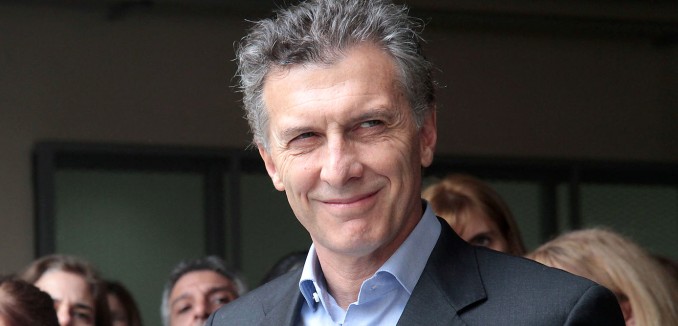Sunday’s triumph of Mauricio Macri in Argentina’s presidential runoff election against government candidate Daniel Scioli marks a sea change in Argentine politics. Macri’s victory puts an end to twelve years of “Kirchnerism” in Argentina – a colorful blend of traditional Peronist power politics at home and alliances with repressive regimes abroad, most obviously Venezuela and Iran, all swathed in heated rhetoric of struggle in the face of nefarious international conspiracies against Argentina, many of them supposedly led by Jews.
Macri is of Italian descent. He made his way into politics via the presidency of the popular Boca Juniors soccer club and then by becoming mayor of the city of Buenos Aires. His family’s wealth certainly gave him a head start both in life and in politics, but does not suffice to explain his victory yesterday. His political skills have been consistently underestimated and have grown over the years. His low-key, technocratic style appealed to an electorate sick of being hectored by its leaders. While often described as a right winger or a conservative in the international media, it might be more accurate to describe him as a pragmatic centrist; he’ll do what he thinks will work.
At his first press conference on Monday morning, the president-elect, who takes office on December 10, repeated two of his campaign commitments. The first of these was that he would send a bill to the nation’s Congress to annul the 2013 pact with Iran, which ostensibly aimed to seek justice for the 85 victims of the 1994 terrorist attack on the AMIA Jewish community center in Buenos Aires, but which the late Federal Prosecutor Alberto Nisman believed was no more than a façade to cover up a secret agreement that guaranteed impunity to the perpetrators.
International arrest warrants are still outstanding against a number of senior Iranians suspected of having participated in the atrocity. In January of this year, Nisman was found shot dead in his apartment four days after making a formal complaint against President Cristina Fernández de Kirchner and a number of her most senior officials, in which he accused them of using the pact to cover up the massacre.
Even if Macri’s proposed bill gets through Congress, the step will be largely symbolic in nature, given that the Iranians have long since lost interest in implementing the pact, which in any case is bogged down in legal disputes in Argentina’s courts. Still, in the current global political climate, even symbolic steps to place limits on Iranian ambitions have to be valued positively.
The second measure promised by Macri was to invoke the so-called “democracy clause” against Venezuela in the agreement governing the Mercosur trade bloc, due to the extensive and well-documented record of human rights abuses by the regime in Caracas. As well as Argentina and Venezuela, the bloc includes Brazil, Bolivia, Paraguay and Uruguay. Invoking this clause would be the first step towards expelling Venezuela from Mercosur; given that the chavista regime there is Iran’s closest regional ally, this would mark another reversal for the mullahs in Tehran.
More than ten months after Nisman’s body was discovered in suspicious circumstances, his death remains shrouded in mystery. The official investigation has produced no definitive findings, though the government’s wish to portray his death as a suicide is more than obvious. The new president has probably already harvested all the possible political rewards available from the public disgust produced by the death without actually saying very much about it, and is unlikely to want to spend any of his political capital on efforts to have the death investigated in a serious way.
It is also unlikely that there will be any significant progress in the investigation into the AMIA massacre itself for similar reasons. Again, there are no political gains to be had for Macri in putting any energy into pursuing this case. As with Nisman’s death, any effort so expended might stir up trouble from the amalgam of intelligence officials, police, judges, prosecutors, “businessmen,” and common criminals that make up Argentina’s “deep state.” The new president will have enough on his plate dealing with the disastrous economic situation in Argentina. And even if Macri was filled with desire to bring the AMIA killers to justice and find out what really happened to Nisman, it’s hard to imagine that he would get much in the way of encouragement from the Obama administration in Washington.
Macri’s election thus marks a step back for Iran’s interests in the region and is a warning sign for the Venezuelan regime, which is facing parliamentary elections in December. However, it would be unwise to hope that it will lead to progress on the AMIA massacre investigation, the worst single anti-Semitic atrocity since World War II, or the investigation into the death of Alberto Nisman, who appears to have paid the ultimate price for seeking to prosecute both its perpetrators and those engaged in the most recent attempt to cover it up.
For a more thorough look at the history of the AMIA attacks and Argentina’s shameful refusal to bring its perpetrators to justice, read Has Argentina Turned Against Its Jews?, written by the author for the October 2014 issue of The Tower Magazine.




